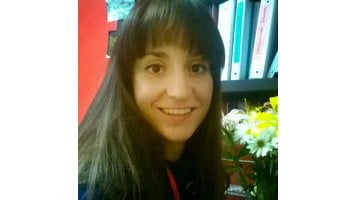What to know
“I had the chance to prevent my cancer. Please don’t miss your chance. Vaccinate yourself and your children.”

Kristina's story
I am married and have two children. I am a registered nurse and work in a local health department in communicable/vaccine preventable disease and immunizations. I am athletic, active, and enjoy time spent outdoors.
For as long as I can remember, I had episodes of painful intercourse but not consistently. I had no other symptoms. I had been a smoker for 12 years (quitting while pregnant and breastfeeding), but at the time of diagnosis, I hadn't smoked for about two years.
I have no underlying health conditions and was and am a generally healthy woman. I had some abnormal Pap tests in my early 20s, and was treated with cryosurgery followed by a LEEP. [Editor's note: cryosurgery (also called cryotherapy) is the use of extreme cold to destroy abnormal tissue. LEEP—short for loop electrosurgical excision procedure—is a technique that uses electric current passed through a thin wire loop to remove abnormal tissue.]
After that, my annual Pap tests were normal. But I had to miss close to two years of getting a Pap test due to lack of insurance. [Editor's note: For women with a recent history of abnormal Pap test results, the recommended time between screening tests may be shorter than for women with normal Pap test results.]
Nevertheless, when I did have a Pap test in 2014, I was also tested for HPV for the first time. An HPV infection in your 20s is not a huge concern, so doctors don't routinely screen women until their 30s. [Editor's note: Human papillomavirus (HPV) is the main cause of cervical cancer. It is a common virus that is passed from one person to another during sex. Most people will have HPV at some point in their lives, but few women will get cervical cancer.]
I received a call from my gynecologist reporting that my Pap was normal but that she had found HPV 16. Being extremely well-informed with my new position in immunizations and public health, I was very concerned. I wondered why my immune system didn't kill the HPV virus off in my 20s like most people's do. I thought that maybe I didn't sleep enough. Maybe I was stressed. Maybe I didn't eat right. Somehow, this doesn't seem like a unique lifestyle for a young adult—but it all affects the immune system.
My provider decided to do a colposcopy to confirm no further abnormalities were present. During the procedure, I remember my doctor saying, "Well, nothing is really lighting up here, but I'll go ahead and take a sample while I'm here." I will never forget the phone call I received from my doctor with the results of the pathology/cytology. She told me, "I have to say, I was really surprised to see this come across my desk today but we did find cancer."
My life came to a screeching halt. I was devastated.
I was referred to an oncologist to begin the process of what would eventually result in a modified radical hysterectomy due to stage 0 cancer. [Editor's note: Stage 0 cervical cancer is also referred to as carcinoma in situ, and means that abnormal cells are found in the innermost lining of the cervix, but they have not spread. These cells may become cancer and spread into nearby normal tissue if they are not treated.]
The whole process involved agonizing periods of waiting for results from different pathology reports, during the period of preparation before and after the hysterectomy. The adjustment and toll it took on my marriage was significant. I am lucky to have a very supportive husband, but this was very difficult for him as well. For someone who is not in the medical field or having any specific knowledge of HPV and its prevalence, this was very concerning to him. Until he researched the virus himself, my husband didn't realize how prevalent HPV was and that you can harbor the virus for years, without symptoms. I have become very comfortable discussing my story and I will never take the road of shame when it comes to HPV, considering how common it is.
As a registered nurse in the field of public health and immunizations, I now have a very personal source of experience when it comes to vaccine-preventable disease. I am a survivor of a vaccine-preventable cancer. I share my story daily with young women and parents who may not realize how HPV relates to them or their child. I remember driving in my car at age 25, when the HPV vaccine became available, and I heard something on the radio about it. I vividly recall thinking, "I'm not sleeping around. I'm a healthy girl. I don't need this new vaccine. Besides when would I have time?"
My message is this: I had the chance to prevent my cancer. Please don't miss your chance. Vaccinate yourself and your children.
[Note: HPV vaccination is not recommended for everyone older than age 26 years. However, some adults age 27 through 45 years who are not already vaccinated may decide to get the HPV vaccine after speaking with their doctor about their risk for new HPV infections and the possible benefits of vaccination. HPV vaccination in this age range provides less benefit, as more people have already been exposed to HPV.]
